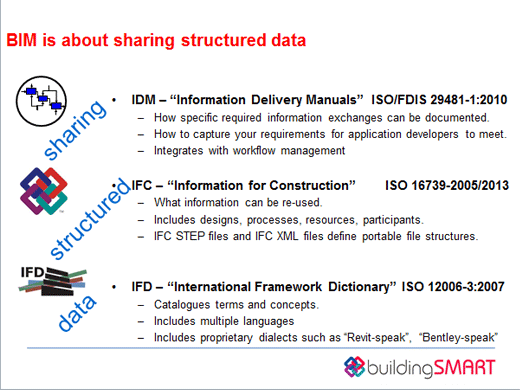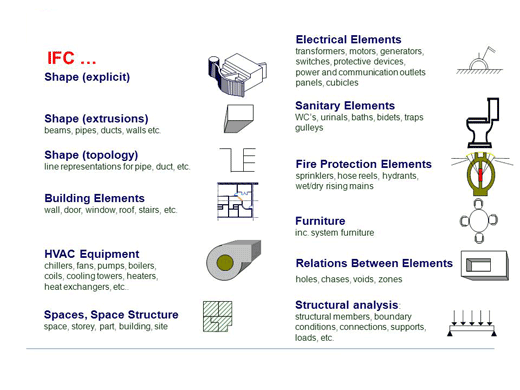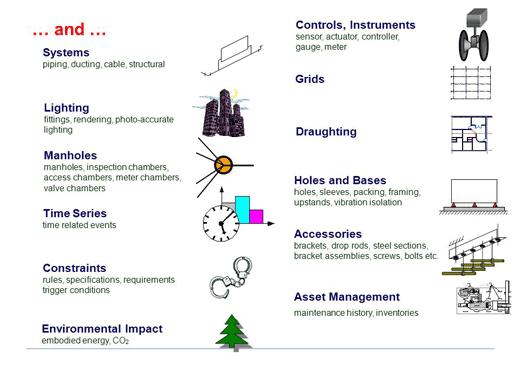Whether or not one accepts that waste and inefficiency accounts for 30% of the turnover of our sector, there are statistics that indicate that we replace only 1% of our building stock annually, whereas our competitors replace around 5% and in some cases nearly 20%. There is a lot to play for if the industry can reduce risk and improve our process and our product.
Other industries including aerospace, automotive, ship-building and process plant have each come to the common realisation that standards enhance competitiveness. Each has developed a suite of three standards to meet its needs.

In the construction sector, buildingSMART is the leading organisation devoted to identifying and delivering the standards needed. buildingSMART is the international not-for-profit organisation behind the IFC import/export button, now that buildingSMART has actually created three standards for the construction industry. These three distinct and complementary standards respond to the needs of the construction industry to "share structured data". Sharing structured data is the very essence of 'BIM', and of other initiatives such as 'COBie2' and 'Soft Landings', each of which aim for process and product improvement. Let's look at how buildingSMART helps meet this need for sharing structured data.
Sharing?
Sharing begins with making sure the work you produce – at every level – can be used by your colleagues now and in the future, within your team, your organisation and your projects. Doing anything a second time should be more efficient by re-using not only your skills but also the efforts of others. Sharing needs a vision of the process you are taking part in, beyond our contractual silos. buildingSMART has developed the 'Information Delivery Method (or Manual)'. IDM is a simple method that starts by looking at a process –such a cost estimating – with the participants – such as the designer, the client and the consultant – as if in a swimming-race. However the race is not won by racing ahead to the end of the swim-lane first, it is more of a relay race! At various points the baton of project information is passed from one swim-lane to another. Every time the baton is handed over, an information exchange takes place.
The expected information can be formally defined and rules declared for checking. Application developers such as Autodesk Revit or Nomitech CostOS can confirm that their products support these exchanges. The most common collection of information requirements has been named the 'coordination view' and allows consultants to pool their work to identify where more coordination effort is needed. IDM is fully defined in ISO/FDIS 29481-1:2010. Once a process is well documented, then the roles of principals, managers and experts can be summarised and ISO 12911:2012, suggests how 'BIM Guidance' documents, (often mistakenly called 'handbooks' or even 'standards') can be structured to be fully re-usable.
Structured?
Information exchanges are often thought of in terms of printed or frozen documents. However by using structured information, the opportunities for checking and re-use expand exponentially.

A drawing or schedule can only be checked by another consultant, whereas structured data can be re-used, re-checked and re-presented in many different ways. Structuring data requires a 'schema' (or 'template') and buildingSMART develops the IFC schema for this purpose. IFC – think of Information for Construction – covers ALL aspects of construction and buildings, even in areas where we await applications to fully explore – for example Health and Safety.
First developed by a consortium that included Autodesk and Bentley and leading design firms over 12 years ago, IFC reached maturity with the release of IFC2x in 2003. This included a stable core which has been guaranteed to be unchanging ever since and is registered as ISO/PAS 16739-2005. Most applications have supported IFC2x3, which includes three extensions to that core, since 2006. The fourth extension has been finalised, and the entire IFC schema is published on ISO 16739:2013.

Data?
Process improvement is dependent on moving from a document-driven cottage industry to becoming a modern data-driven global sector. As more participants move to exploit these standards there will be issues of terminology. The IFC has led the way be defining names for over 3000 properties, but the International Framework for Dictionaries (IFD) takes this to a new level by registering synonyms for objects and properties in multiple languages including English, Dutch, Norwegian, American, and French. In demonstrations the dictionary has been extended to include 'Revitese'. So if you have ever wondered what an 'Assembly Code' is in UK practice, or how many different kinds of 'k-values' there are, help and more importantly translation is on its way. The IFD is structured to ISO 12006 part 3 and is expanding to meet more and more needs.
In practice
How do these standards affect everyday practice? They help to change the assumptions of the industry that there is no alternative to poor performance. They raise the level of best practice, and offer a means to achieve local improvement. They provide a map for the growth of the industry and allow it to find its way forward. We can look at progress in Singapore, Norway, Denmark and the USA and see that their case-studies far excel anything that is happening in the UK, but know that absorbing these achievements need not be traumatic.
buildingSMART UKI is the UK chapter and welcomes new members who are committed to a sustainable built environment through SMARTER information sharing and communication using open international standards in the building and construction sector, private and public.
More information
www.buildingsmart.com ![]()
www.buildingsmart.org.uk ![]()
www.aec3.com ![]()
Footnote
NBS are members of buildingSMART, and we are actively looking into ways of importing IFC structured data into NBS, and exporting NBS data into IFC format; NBS are also members of the IFD project. NBS are working with AEC3 on the iCAT project ![]() , which is partly funded by Innovate UK.
, which is partly funded by Innovate UK.

